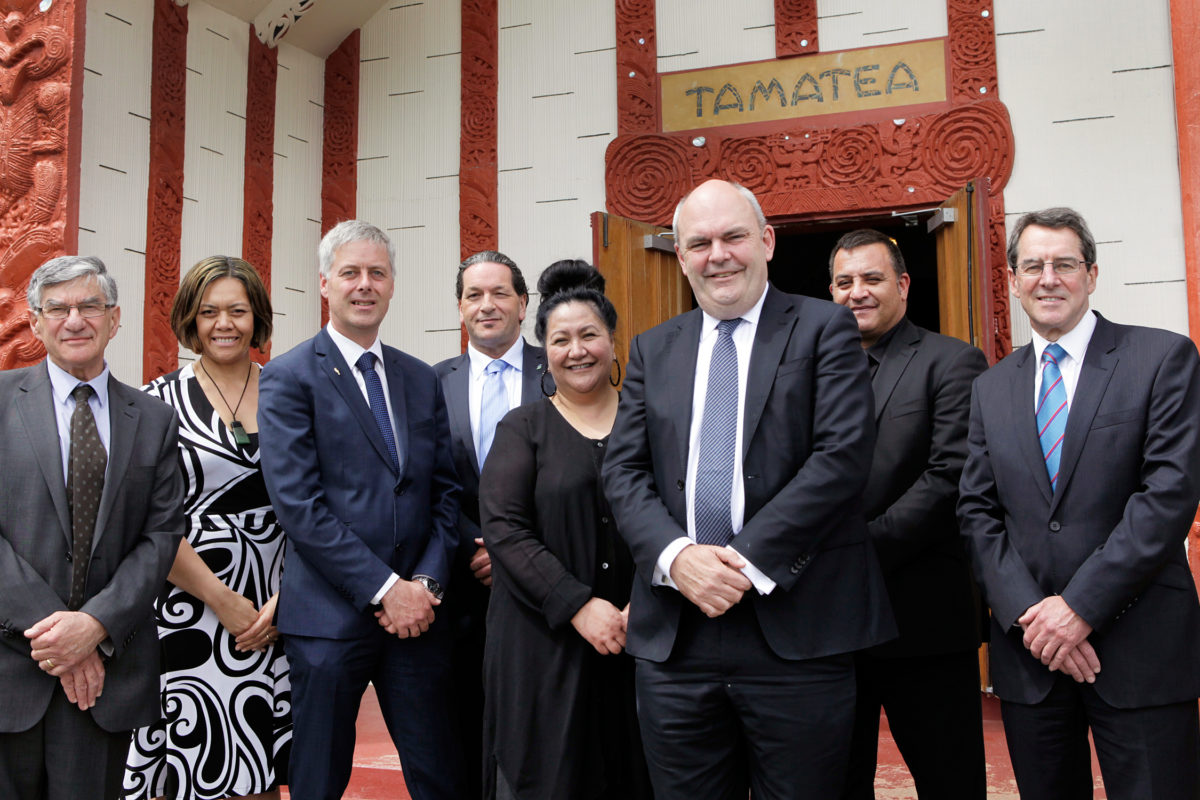Launch: Healthier Lives-He Oranga Hauora National Science Challenge
4 December 2015
New Healthier Lives Challenge takes aim at NZ’s major killers
4 December 2015
Ōtākou Marae
Innovative research aimed at significantly reducing the death and disease burden of some of New Zealand’s leading health problems will be pursued through the Healthier Lives National Science Challenge launched by the Hon Steven Joyce at Ōtākou Marae on the Otago Peninsula today.
Healthier Lives is the latest National Science Challenge to be unveiled by the Government. The Challenges are initiated through the Ministry of Business, Innovation and Employment, and are designed to tackle New Zealand’s biggest science-based issues and opportunities.
Funding of up to $31.3 million over 10 years has been approved for Healthier Lives’ research projects, subject to contract conditions.
Hosted by the University of Otago and involving partners from six other New Zealand universities and three research institutes, the Challenge will tackle cardiovascular disease, cancer, diabetes and obesity with the goal of reducing their overall burden by 25% by 2025.
Director of Healthier Lives, Professor Jim Mann, says that this group of diseases accounts for a majority of premature deaths and much of the burden of serious illness amongst women and men in the prime of life, as well as the stark inequalities in health outcomes amongst Māori and Pacific Peoples compared to other New Zealanders.
Research aimed at reducing these inequalities, also by 25% by 2025, will be a major thrust of the Challenge and will involve initiatives led by Māori researchers with strong community involvement.
Professor Mann says New Zealand’s non-communicable disease statistics are very disturbing.
“We have one of the highest rates of bowel cancer in the world, cardiovascular disease kills more than one in three New Zealanders, eight per cent of the population has type 2 diabetes and nearly two thirds of adults are overweight or obese.
“We aspire to produce innovative research that will, by 2025, help to slash the burden of non-communicable disease by a quarter and by a similar degree reduce inequities in the risk of developing and surviving such conditions that Maori and Pacific Peoples experience,” he says.
Healthier Lives is a highly collaborative initiative encompassing researchers from Counties Manakau District Health Board, ESR, Massey University, Te Roopu Mate Huka the University of Auckland, the University of Canterbury, the University of Otago, the University of Waikato, Waikato Institute of Technology and Whakauae Research, Services.
“In order to achieve our vision we will also be developing close relationships with a range of key stakeholders with aims similar to ours in tackling these four health problems,” Professor Mann says.
The stakeholders include a spread of organisations ranging from government departments through health providers and NGOs to community groups.
The early research projects are:
- Working with Maori and Pasifika communities to develop and test the effects of a lifestyle-focused personalised support programme delivered by mobile phone on risk factors. Principal Investigators: Professor Cliona Ni Mhurchu (University of Auckland), Dr Ridvan Firestone (Massey University), Dr Lisa Te Morenga (University of Otago)
- Establishing a new type of genomic blood test that detects tumour-derived DNA in the blood, to help identify the right treatment for patients with bowel cancer and malignant melanoma, two of New Zealand’s most serious cancers. Principal Investigators: Professor Parry Guilford (University of Otago), Professor Cristin Print (University of Auckland), Dr Chris Jackson (University of Otago)
- Analysing ‘big data’ to identify the reasons underlying greater heart disease and diabetes risk in Māori, Pacific and Indian subcontinent peoples, in order to develop strategies for improved clinical management and reduced inequities. Principal Investigators: Professor Vicky Cameron (University of Otago, Christchurch), Professor Rod Jackson (University of Auckland)
- Exploring the role of culture, community engagement, and cross-sectoral partnerships in improving the effectiveness of interventions and health outcomes in diabetes for Māori. Principal Investigators: Maui Hudson (University of Waikato), Terry Ehau (Te Roopu Mate Huka), Dr Nina Scott (University of Auckland/Waikato DHB)
- Contributing to the Virtual Health Information Network that will use New Zealand’s health datasets and bring together researchers to answer a range of questions, such as, “What impact did the Christchurch earthquake have on cardiovascular hospitalisations?” and “What is the impact on future income earnings of a cardiovascular disease event?” Principal Investigator: Professor Tony Blakely (University of Otago, Wellington)
Professor Mann says the projects are all aimed towards achieving Healthier Lives’ mission of “delivering the right prevention to the right population and the right treatment to the right patient”.
“We are very excited to have the opportunity through this Challenge to pursue research that that will be translated into policy and practice that substantially reduces disease burden and health inequities in New Zealand.
“In terms of this latter aspect of our mission I am delighted that the launch is being held at Ōtākou Marae, which is one of the places where the Treaty of Waitangi was signed.
For more information, contact:
Supporting Healthy Lifestyles: a Māori and Pasifika mHealth approach
Professor Cliona Ni Mhurchu
Circulating tumor DNA for better cancer management: the application of precision oncology to the New Zealand healthcare system
Professor Parry Guilford
Equitable cardiovascular and diabetes risk prediction: better cardiovascular and diabetes outcomes in Māori, Pacific and Indian subcontinent ethnic groups
Professor Vicky Cameron
He Pikinga Waiora: making health interventions work for Māori communities
Maui Hudson
Virtual Health Information Network: capitalising on New Zealand’s health data
Professor Tony Blakely


